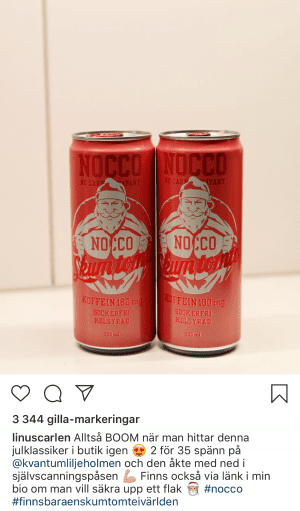Business development • The food and beverage industry has strict regulations to adhere to when it comes to nutritional and health statements in the marketing of their products. The regulations for marketing in social media are not as clear. Misinterpretations are easily made. This happened to Nocco's brand manager Linus Carlén who was recently found to have broken the ICC regulations on advertising on social media by the Swedish Advertising Ombudsman jury for failing to state the commercial purpose of a post on his private Instagram account. Do your co-workers risk the same? Let's look at what applies.
In the beginning of 2019 journalists from the business magazine Resumé that monitors media and market communication, wanted the Swedish Advertising Ombudsman (Reklamombudsmannen; RO) to look into what constitutes hidden advertising in social media. They reported 16 posts from 14 influencers.
Posts on private Instagram accounts
The RON found several posts guilty of hidden advertising. One of the most prominent cases concerns Nocco, a manufacturer of sugar-free functional beverages.
In November of 2018 Nocco’s brand manager Linus Carlén made a post on his private Instagram account. In the post he expresses a personal and positive view of the company’s beverages. He also stated how much they cost: two for 35 SEK. But to see the full post the reader had to click on “more”. The post then got a commercial character where the brand manager suggested a store and encouraged the reader to buy. A clear statement that it is promotional was missing, said the RON, and their decision was; in breach of the rules.

Linus Carlén’s post on Instagram: “Like BOOM when you find this X-mas classic in the stores again. 2 for 35 at @kvantumliljeholmen and it went right into my self-scan bag. Also available via link in my bio if you want to secure a whole box #nocco #theresonlyonemarshmallowsantaintheworld”.[/caption]
Transparency for advertisers and influencers is scant
Behind the survey of the posts and reports to the RO are the journalists Yasmine Winberg and Julia Lundin of the business journal Resumé. Over the years they have noticed that both advertisers and influencers are often uncertain what actually applies.
– We decided to look into this as there is, in our opinion, no clear and set practice. Despite the fact that influencers have been active for more than ten years, there is only one conviction of an influencer in the Patent and Market Court. At the same time influencers become more and more important for marketing, says Julia Lundin.

A large part of advertising
Surveys done by the Institute for Advertising and Media Statistics (IRM) show that more and more funds are spent on influencer marketing in Sweden. During 2017 the market had a turnover of 660 MSEK, which is an increase of 33% from the previous year.
– The influencer marketing business is estimated to soon reach a billion SEK’s worth of the total advertising cost in Sweden, says Julia Lundin.
Employees can find themselves in hot water
The marketing law is clear. It applies to all marketing, no matter the media. If the purpose of a post is commercial, the post shall be marked as such. This also applies to those employed by the company.
But the question is if the marketing law has kept up with the increasing number of influencers and hired brand ambassadors. And if companies and influencers are aware that any marketing needs to be identified as such.
– When we have tried to clarify, in previous articles, when you need to identify advertising and when you don’t, both influencers and lawyers have not been entirely certain. Nobody knows for sure. And as the RO is a self-regulatory organ there are no sanctions against influencers, meaning that this wild west approach can simply just go on, says Julia Lundin.
More brand ambassadeurs could be rebuked
Resumé’s review has awakened the debate on what constitutes your own opinion and what constitutes advertising. Particularly the matter of what employees can say in social media without it constituting advertising.
What is most notable is the RON’s decision against Nocco’s brand manager Linus Carlén.
– He markets products from the company where he is an employee. This sets the standard that other brand ambassadors may be tried and convicted. Many companies and consultants have contacted us because they are uncertain of how to act, says Julia Lundin.
Subjective and tricky
After the decisions by the RON Yasmine Winberg and Julia Lundin have also looked at how the agreements between advertisers and influencers hired by companies have been interpreted by the RON.
– How come an influencer who has signed on for three pictures but posts two extra for free, can be acquitted? While Linus Carlén, who every day is paid for his role at the company and has clearly stated that his salary is not at all dependent on his activity on Instagram, is convicted. It gets confusing, says Julia Lundin.
Julia Lundin tells us that Linus Carlén was acquitted in another case. The RON considered that this particular post was, to the average consumer, clear advertising.
– This risks becoming subjective, and tricky for the influencer to understand, she states.
Tougher restrictions abroad
The journalist duo at Resumé are hoping that the reviewing of posts in social media will have raised awareness with influencers, influencer networks, companies and employees, and that they will all rather be safe than sorry when it comes to marking as advertising.
– But the grey zone is still substantial and before a practice is set in a legal court the uncertainty in the field is considerable. We definitely see tougher restrictions as regards the marking of advertising abroad while Sweden is still marking time. This is why it’s appropriate to take the lead from other countries, says Julia Lundin.
Are we in a grey zone?

Are we in a grey zone? We ask Mats Rönne, independent consultant and former chairman of the association for Swedish Advertisers and a member of the RON.
– Both yes and no, I’d say. There are some things that need to be marked as advertising, and that’s when there is a commercial purpose and they refer to clear commercial matters. But some things are just free speech. In that case we have the right to any kind of opinion. The grey zone is where these two worlds meet, says Mats Rönne.
Transparency is the answer
The question is if you, as an employee, need to worry about promoting your company. Mats Rönne means that it is an advantage to all those who work for a company to always be transparent in their communication.
– Suppose you are an employee of a company. The fewer hidden agendas you have, the more transparent you are in your communication, he says.
Mats Rönne mentions as an example that the RON during several years has had recurring cases regarding so called natives. Natives are advertising articles that look and act like the host medium. These are regularly found in breach of the ICC regulations by the RON as many lack a clear advertising marking, or it has been too vague.
– So it is always better to be transparent if you want to appear credible. Transparency and credibility goes hand in hand. When you market a product you need to be clear regarding the purpose. Exactly how you present your arguments and induce purchase is more free, he says.
The company is behind the ad
Mats Rönne stresses that it’s important to remember that the advertiser has a big responsibility for the marketing and how it is shaped and expressed. After all, it is the advertiser who is the originator of the marketing.
– As a purchaser of advertising it is therefore important to have it all set down in a cooperation agreement. In other words, what am I expecting, what are my intentions? I need to know what I am paying for and that both parties will stay within the boundaries. The legal boundaries is something you, as an advertiser, need to find out. But in principal, anything that happens in your own marketing channels is risk free as long as the sender is visible. Advertising in social media or other, paid for, media, is stricter, says Mats Rönne.
What can companies or influencers learn from the decisions?
– The important thing to remember is that responsibility lies with all parties. If it is a commercial cooperation – which it most often is – it is advertising and should be marked as such. It is always better to be safe rather than sorry, says Mats Rönne.
On the safe side
So, what happens if your co-workers speaks out positively in social media about your products?
Nothing, as long as they stay within the guidelines of the marketing law. According to the RON there is no general regulation that stipulates that advertising must be marked as such – as long as it is clear that the content is of a commercial nature. The important thing is that a consumer or a follower of the social media is not misguided. If a post is commercial but could be confused with editorial material or similar – mark it clearly as advertising in the beginning of the post. Then you are on the safe side.
We have unsuccessfully tried to reach Linus Carlén, brand manager at Nocco, for a comment.
Please, share this article if you liked it.
[et_social_share]




